Founding of the University

A Japanese statesman who served as the prime minister, Shigenobu Okuma founded Waseda University, then called Tokyo Senmon Gakko, on October 21, 1882. In the first class, 80 students enrolled in the Departments of Political Science, Law, English, and Physical Science. With wishes that the students of Waseda to be altruistic and help others in need, his words were, “Be ambitious to contribute to the world without regard to the benefits yourself, family, or your country.”
Below is a chronology highlighting the University’s events.
Chronology
1882 - 1944
| Year | Event |
|---|---|
| 1882 | Tokyo Senmon Gakko (College) founded by Shigenobu Okuma with the Departments of Political Science, Law, English, and Physical Science. |
| 1890 | Department of Literature established. |
| 1893 | Graduate courses launched in the Department of Literature. |
| 1900 | Faculty members sent to Europe and America for the first time under the newly-established Foreign Travel Scholarships for faculty members. |
| 1902 | University Library building completed. Acquisition of university status. Renamed Waseda University, the institution comprised Schools of Political Science & Economics, Law, and Literature, seven senmon-bu (junior colleges), and a single graduate school. |
| 1903 | School of Education established. |
| 1904 | University status acquired under Senmon Gakko School Act. School of Commerce established. |
| 1905 | School for Chinese students established (closed in 1910). |
| 1909 | School of Science and Engineering established. |
| 1920 | Chartered under the newly enacted University Act comprising five undergraduate schools: Political Science and Economics, Law, Literature, Commerce, and Science and Engineering; Department of Commerce added as a professional training division. First Higher School (3-year course) newly launched. |
| 1922 | 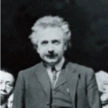 Death of Shigenobu Okuma, founder of the University. Death of Shigenobu Okuma, founder of the University.The campus overflows with students trying to get a look at the famous scientist when Albert Einstein comes to give a lecture at Waseda. |
| 1925 | New University Library and Student Hall completed. |
| 1927 | Okuma Auditorium completed. |
| 1928 | Tsubouchi Memorial Theatre Museum completed. |
| 1933 | Administration Building, Gymnasium, and Television Laboratory completed. |
| 1938 | Kagami Memorial Laboratory for Materials Science and Technology established. |
| 1939 | Coeducation introduced. |
| 1940 | Science and Engineering Research Laboratory established. Institute of Social Sciences established. |
1945 -
| Year | Event |
|---|---|
| 1945 | Imperial Memorial Hall, Okuma Kaikan faculty club, First Higher School Building, and Science and Engineering Research Laboratory Building destroyed by air-raids. Reconstruction and renovation started. |
| 1949 | Four-year college curricula established, with eleven schools, in accordance with the new education law. Waseda Senior High School started as an affiliated school. |
| 1951 | Graduate Schools (master’s degree programs) under the new educational program established, with six Schools. Two new graduate school buildings, one for Humanities and Social Sciences and the other for Science and Engineering, completed. |
| 1953 | Graduate Schools (doctoral degree programs) established. |
| 1956 | 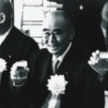 Waseda has turned out many politicians including several prime ministers since Tanzan Ishibashi, the first Waseda alumnus to be elected P.M. Waseda has turned out many politicians including several prime ministers since Tanzan Ishibashi, the first Waseda alumnus to be elected P.M.Systems Science Institute established. |
| 1957 | 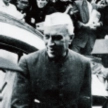 Together with Tanzan Ishibashi, Indian Prime Minister Jawaharlal Nehru is the first recipient of an honorary doctorate from Waseda. Together with Tanzan Ishibashi, Indian Prime Minister Jawaharlal Nehru is the first recipient of an honorary doctorate from Waseda. |
| 1958 | Advanced Teacher’s Training Course established. Institute of Comparative Law established. |
| 1959 | Center for Informatics established. |
| 1962 | 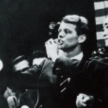 Institute of Language Teaching established. Institute of Language Teaching established.Robert Kennedy attends a student debate in the Okuma Auditorium. On his return to the United States he published an account of his travels “Just Friends and Brave Enemies”, donating the royalties to Waseda to create the Robert Kennedy Scholarship. |
| 1963 | International Division established. |
| 1966 | School of Social Sciences (Evening Division only) established. |
| 1968 | Evening Division of the School of Science and Engineering abolished. |
| 1973 | Evening Divisions of the Schools of Political Science and Economics, Law, and Commerce abolished. |
| 1974 | Institute for Research in Business Administration established. |
| 1978 | Institute for Research in Contemporary Political & Economic Affairs established. |
| 1979 | 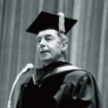 Herbert von Karajan receives an honorary doctorate. In commemoration of his visit, the longtime resident counductor of the Berlin Philharmonic conducts the Waseda Symphony Orchestra. Herbert von Karajan receives an honorary doctorate. In commemoration of his visit, the longtime resident counductor of the Berlin Philharmonic conducts the Waseda Symphony Orchestra. |
| 1981 | Extension Center established. |
| 1982 | Waseda Honjo Senior High School started as an affiliated school. First centennial anniversary of the founding celebrated. |
| 1987 | School of Human Sciences established. Advanced Research Center for Human Sciences established. |
| 1988 | Center for Japanese Language established. |
| 1990 | Graduate School of Education established. Center for Scholarly Information established. |
| 1991 | Graduate School of Human Sciences established. |
| 1993 | 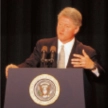 Advanced Research Center for Science and Engineering established. Advanced Research Center for Science and Engineering established.Bill Clinton gives a lecture at the Okuma Auditorium followed by a friendly question and answer session with students. |
| 1994 | Graduate School of Social Sciences founded. |
| 1995 | 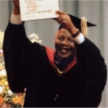 Nelson Mandela is awarded an honorary doctorate and speaks passionately about democracy and peace in his recipient’s address. Nelson Mandela is awarded an honorary doctorate and speaks passionately about democracy and peace in his recipient’s address. |
| 1996 | Media Network Center established to allow integration of Center for Informatics and other units working on information systems. |
| 1997 | Institute of Asia-Pacific Studies established as successor to the former Institute of Social Science and the Systems Science Institute. |
| 1998 | 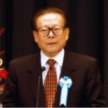 Graduate School of Asia-Pacific Studies established. Graduate School of Asia-Pacific Studies established.Aizu Museum founded. Global Information and Telecommunication Institute established. Institute for Advanced Studies in Education established. In the first official visit to Japan by a Chinese head of state, President Jiang Zemin gives a lecture at the Okuma Auditorium. |
| 1999 | Human Service Center established. |
| 2000 | Graduate School of Global Information and Telecommunication Studies established. Open Education Center established. Kyushu Laboratory, Advanced Research Institute for Science and Engineering established. |
| 2001 | Graduate School of Japanese Applied Linguistics established. Art and Architecture School replaced College of Technology. Student Union Building (Toyama Campus) completed. Comprehensive Research Organization established. Research and Development Center established. |
| 2002 | 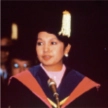 Distance Learning Center established. Distance Learning Center established.Hirayama Ikuo Memorial Volunteer Center established. Gloria Macapagal-Arroyo becomes the third Philippines President to receive an honorary doctorate. |
| 2003 | School of Sport Sciences established. Graduate School of Information, Production and Systems established. Okuma School of Public Management, Graduate School of Information, Production and Systems established. Graduate School of Asia-Pacific Studies (MOT) Established. e-school within School of Human Sciences established. Kawaguchi Art School established. |
| 2004 | 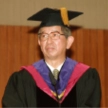 School of International Liberal Studies established. School of International Liberal Studies established.Department of Global Political Economy established within the Faculty of Political Science and Economics. Waseda Law School established. Graduate School of Finance, Accounting and Law established. President of Academia Sinica and Nobel Prize Laureate in chemistry, Yuan Tseh Lee receives an honorary doctorate in recognition of great contributions to humankind as a scientist. |
| 2005 | 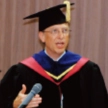 Graduate School of Accountancy established. Graduate School of Accountancy established.Chairman and Chief Software Architect of Microsoft Corp. William Henry “Bill” Gates III receives an honorary doctorate. Gates gives a memorable speech with a message, “I look forward to the contributions that today’s university students will make to the world”. |
| 2006 | 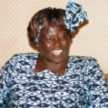 Graduate School of Sport Sciences established. Graduate School of Sport Sciences established.Wangari Muta Maathai, the Nobel laureate for Peace receives an honorary doctorate in recognition of her civilian efforts in achieving peace and environmental sustainability, as represented by the Green Belt Movement. |
| 2007 | 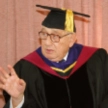 Schools of Letters, Arts and Sciences I and II were reorganized into School of Culture, Media and Society and School of Humanities and Social Sciences. Schools of Letters, Arts and Sciences I and II were reorganized into School of Culture, Media and Society and School of Humanities and Social Sciences.School of Science and Engineering was reorganized into School of Fundamental Science and Engineering, School of Creative Science and Engineering, and School of Advanced Science and Engineering. Graduate School of Science and Engineering was reorganized into Graduate School of Creative Science and Engineering, Graduate School of Advanced Science and Engineering, and Graduate School of Environment and Energy Engineering. 125th anniversary. Henry A. Kissinger receives an honorary doctorate in recognition of his contribution to world peace. He emphasized the importance of international cooperation to students in his recipient’s address. |
| 2008 | Graduate School of Teacher Education established. The Tokyo Women’s Medical University-Waseda University Joint Institution for Advanced Biomedical Sciences (TWIns) established. National Chairman of China Hu Jintao visits Waseda University for speech on future-oriented amity to next term’s Japanese and Chinese youth. 100th anniversary of Faculty of Science and Engineering. US-Japan Research Institute (USJI) established. |
| 2009 | Waseda Setsyryo Junior High School, High School opens. Waseda BioScience Research Institute in Singapore (WABIOS) established. Special lecture by Kim Young-Sam, former President of the Republic of Korea. George W. Bush, 43rd President of the United States of America, gives special talk. |
| 2010 | Cooperative Major in Advanced Biomedical Sciences (with Tokyo Woman’s Medical University) opens. Cooperative Major in Nuclear Energy (with Tokyo City University) opens. Cooperative Major in Advanced Health Science (with Tokyo University of Agriculture and Technology) opens. Waseda Saga Junior High School, High School opens. Secretary-General of the United Nations Ban Ki-moon visits Waseda University for speech on “Peace and Disarmament” and dialogue with students.Residence Life Center established. |
| 2011 | Office for Aiding Reconstruction from the Great East Japan Earthquake established. Center for Research on Reconstruction from the Great East Japan Earthquake established. |
| 2012 | Prime Minister Yoshihiko Noda ’80 (School of Political Science and Economics) visits Waseda University. WASEDA VISION 150 presented. |
| 2013 | Graduate School of International Culture and Communication Studies established. Center for International Education established. Quarter system introduced to 6 undergraduate and 11 graduate schools as well as 2 institutes (total of 465 classes (385 subjects)). |
| 2014 | Center for Higher Education Studies established. Waseda International Student House (WISH) opens. Renovation of Building No. 3 completed. |
| 2015 | U.S. Ambassador to Japan Caroline Kennedy visits Waseda University and delivers a speech at the international symposium “The Torch Has Been Passed: JFK’s Legacy Today.” Kawaguchi Art School closed. Memorial Hall starts to undergo large-scale reconstruction. Waseda Shogekijo Drama-kan Theater opens. |
| 2016 | Institute for Advanced Social Sciences established. Graduate School of Business and Finance established. Teacher Education Center established. Office for Promotion of Gender Equality reorganized to establish Office for Promotion of Equality and Diversity. Development of University-Social Relations Liaison Office renamed as University-Social Relations Liaison Section. Fund-Raising Section and External Affairs Section reorganized to establish External Affairs and Fund-Raising Section. Olympic and Paralympic Project Promotion Section established. |
| 2017 | Student Diversity Center established. President of the Republic of Guinea Alpha Condé visits. WASEDA NEO starts. British Foreign Secretary Boris Johnson visits Waseda University. President of the Republic of Palau Thomas Remengesau Jr. visits. Center for Data Science established. |
| 2018 | Waseda University History for Tomorrow Museum opens. Waseda Arena opens. |
| 2019 | Sports Museum opens. Research Innovation Center established. |











